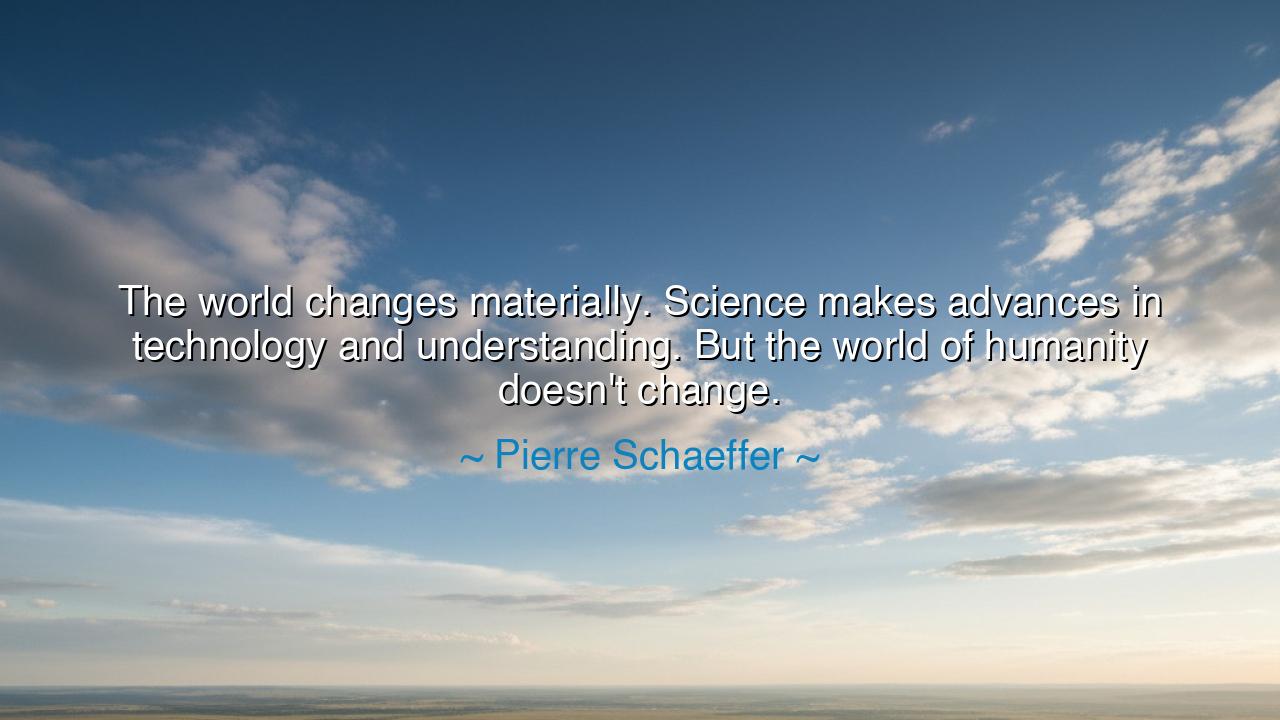
The world changes materially. Science makes advances in
The world changes materially. Science makes advances in technology and understanding. But the world of humanity doesn't change.






Listen, O Seekers of Truth, to the words of Pierre Schaeffer, who speaks not of the advances of the world but of the unchanging nature of humanity. "The world changes materially. Science makes advances in technology and understanding. But the world of humanity doesn't change." In these words, Schaeffer reveals a profound truth—the material world may transform through the great strides of science and innovation, but the heart of humanity remains constant, tethered to the same emotions, the same desires, and the same struggles that have defined us since the dawn of time. Science and technology may offer us new tools, new possibilities, but the core of human experience—our love, our fear, our hope, and our need for connection—remains unaltered by these advances.
Consider, O Seekers, the ancient wisdom passed down through the ages. Socrates asked, "What is the good life?" and in his quest for the truth, he uncovered the eternal nature of human striving—our desire for wisdom, virtue, and the questioning of our own existence. Even in his time, the world was changing, with new ideas arising in the fields of philosophy and science. Yet Socrates recognized that despite the shifting landscape of knowledge, the human soul remained unchanged. The questions he asked, the virtues he sought, and the ideals he pursued were timeless—for in the heart of every person lies the same fundamental desire for meaning and purpose, irrespective of the age they live in.
Schaeffer's insight also speaks to the work of the great philosophers and scientists throughout history, who, in their pursuit of knowledge, sought to understand both the material world and the human condition. Take, for example, Isaac Newton, whose groundbreaking work in physics revolutionized our understanding of the universe. Newton's laws of motion and his theory of gravity transformed science and changed the way we perceive the cosmos. Yet, even as Newton uncovered the mysteries of the physical world, he grappled with the same existential questions that have occupied humanity for millennia: questions about the nature of existence, the role of the divine, and the purpose of life. Despite his extraordinary advances in science, Newton, like all great thinkers, understood that human nature—with its inherent flaws, hopes, and dreams—remains a constant, untouched by the grand revolutions of thought.
Just as Newton's discoveries did not alter the essential human experience, so too does Schaeffer remind us that technology may advance, but the human spirit remains rooted in the same emotions and struggles. The Industrial Revolution, for instance, brought about unprecedented advances in machinery, manufacturing, and transportation. Yet, despite these material changes, the human heart continued to be driven by the same desires for connection, wealth, and freedom. The factory workers who toiled in the mills sought not only a better life but the same dignity, purpose, and community that have always defined humanity. Science and technology may have altered our surroundings, but they have not altered our deepest needs and aspirations.
And so, O Seekers, we see that while humanity continues to evolve in its external circumstances, the core of human existence remains unchanged. Technology has revolutionized the way we communicate, travel, and work, yet we still seek love, meaning, and connection—the same fundamental desires that have always driven us. We see this in the advancements of the modern world, from the age of computers to the rise of artificial intelligence. But even in this new era, our questions about identity, purpose, and the nature of life remain the same. Just as Socrates and Newton grappled with the essence of the human condition, so too do we today.
The lesson, O Seekers, is clear: while science and technology continue to advance and transform our material world, the heart of humanity remains constant. Progress does not change our essence. The challenges we face—questions of love, suffering, and the search for meaning—are as old as time itself. As we move forward into a world shaped by new technologies, we must remember that the true essence of life is not found in machines or inventions, but in the timeless struggles of the human spirit. It is through these struggles, these eternal questions and desires, that we find our purpose.
So go forth, O Seekers, with the understanding that progress in the material world does not define us. It is the human heart, with its boundless capacity for love, curiosity, and meaning, that is the true measure of our journey. As we embrace the wonders of science and technology, let us not forget that the answers to our deepest questions do not lie in the machines we build, but in the timeless wisdom that we carry within our souls.






AAdministratorAdministrator
Welcome, honored guests. Please leave a comment, we will respond soon